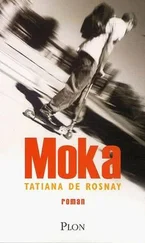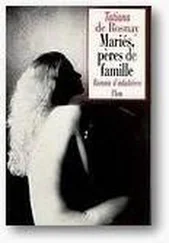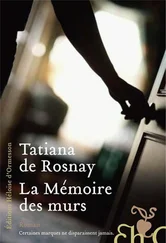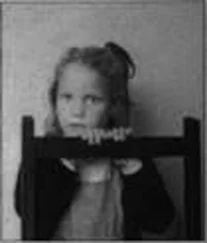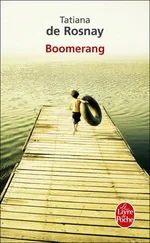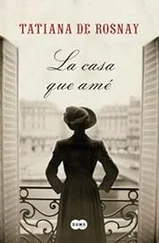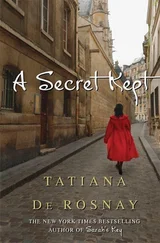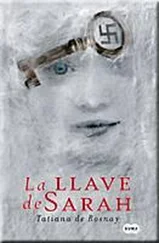Just above the barbed wire, the girl could glimpse the village. The black spire of a church. A water tower. Roofs and chimneys. Trees. Over there, she thought, in those nearby houses, people had beds, sheets, blankets, food, and water. They were clean. They had clean clothes. Nobody screamed at them. Nobody treated them like cattle. And they were just there, just on the other side of the fence. In the clean little village where she could hear the church bell chime.
There were children on vacation over there, she thought. Children going on picnics, children playing hide-and-seek. Happy children, even if there was a war, and less to eat than usual, and maybe their Papa had gone away to fight. Happy, loved, cherished, children. She couldn’t imagine why there was such a difference between those children and her. She couldn’t imagine why she and all these people here with her had to be treated this way. Who had decided this, and what for?
They were given tepid cabbage soup. It was thin and sandy. Nothing else. Then she watched as rows of women stripped naked and fought to wash their dirty bodies under a trickle of water over rusty, iron washbasins. She found them ugly, grotesque. She hated the flabby ones, the skinny ones, the old ones, the young ones; she hated to have to see their nudity. She did not want to look at them. She hated having to see them.
She huddled against her mother’s warmth and tried not to think of her brother. Her skin felt itchy, her scalp too. She wanted a bath, her bed, her brother. Dinner. She wondered if anything could be worse than what had been happening to her over the past few days. She thought of her friends, of the other little girls in her school who also wore stars. Dominique, Sophie, Agnès. What had happened to them? Had some been able to escape? Were some safe, hiding somewhere? Was Armelle hiding with her family? Would she ever see her again, see her other friends again? Would she go back to school in September?
That night, she couldn’t sleep; she needed her father’s reassuring touch. Her stomach hurt her, she felt it contract with pain. She knew they were not allowed to leave the barracks during the night. She clenched her teeth, wrapping her arms around her belly. But the pain grew worse. Slowly she got up, tiptoed through the rows of sleeping women and children, to the latrines outside the door.
Glaring spot lights swept the camp as she huddled over the planks. The girl peered in and saw thick pale worms writhing in the dark mass of shit. She was afraid a policeman up there in the watchtowers would see her bottom, and she pulled her skirt down over her loins. She quickly made her way back to the barrack.
Inside, the air was stuffy and foul. Some children whimpered in their sleep. She could hear a woman sobbing. She turned to her mother, gazing at the sunken, white face.
Gone was the happy, loving woman. Gone was the mother who used to sweep her into her arms and whisper love words, Yiddish nicknames. The woman with the glossy honey locks and the voluptuous figure, the one all the neighbors, all the shopkeepers would greet by her first name. The one who smelled a warm, comforting, motherly smell: delicious cooking, fresh soap, clean linen. The one with the infectious laugh. The one who said that even if there was a war, they’d pull through, because they were a strong, good family, a family full of love.
That woman had little by little disappeared. She had become gaunt, and pale, and she never smiled or laughed. She smelled rank, bitter. Her hair had become brittle and dry, streaked with gray.
The girl felt like her mother was already dead.

THE OLD WOMAN LOOKED at Bamber and me with rheumy, translucent eyes. She must be getting on toward a hundred, I thought. Her smile was toothless, like a baby’s. Mamé was a teenager compared to her. She lived just above her son’s shop, the newsdealer on the rue Nélaton. A poky apartment cluttered with dusty furniture, moth-eaten rugs, and withered plants. The old lady sat in a sagging armchair by the window. She watched us walk in and introduce ourselves. She seemed pleased to be entertaining impromptu visitors.
“American journalists, so,” she quavered, appraising us.
“American and British,” corrected Bamber.
“Journalists that are interested in the Vel’ d’Hiv’?” she asked.
I got my pen and pad of paper out and balanced them on my knee.
“Do you remember anything about the roundup, Madame?” I asked her. “Could you tell us something, even the smallest detail?”
She let out a cackle.
“You think I don’t remember, young lady? You think I have forgotten, maybe?”
“Well,” I said, “it was a while ago, after all.”
“How old are you?” she asked bluntly.
I felt my face redden. Bamber hid a smile behind his camera.
“Forty-five,” I said.
“I am going to be ninety-five years old,” she said, flaunting decayed gums. “On July 16, 1942, I was thirty-five. Ten years younger than you are now. And I remember. I remember everything.”
She paused. Her dimmed eyes looked outside, onto the street.
“I remember being woken very early by the rumbling of buses. Buses just outside my window. I looked outside and I saw the buses arrive. More and more buses. Our own city buses, the buses I used every day. Green and white. So many of them. I wondered why on earth they were here. Then I saw the people come out. And all the children. So many children. You see, it’s hard to forget the children.”
I scribbled away as Bamber slowly clicked his camera.
“After a while I got dressed and went down with my boys, who were small then. We wanted to know what was going on, we were curious. Our neighbors came, too, and the concierge. Then we saw the yellow stars, and we understood. The Jews. They were rounding up the Jews.”
“Did you have any idea of what was going to happen to these people?” I asked.
She shrugged her old shoulders.
“No,” she said. “We had no idea. How could we? It was after the war that we found out. We thought they were being sent to work somewhere. We did not think anything bad was going on. I remember someone said, ‘It’s the French police, no one will harm them.’ So we did not worry. And the next day, even when this had happened in the middle of Paris, there was nothing in the papers, nothing on the radio. No one seemed preoccupied. So we weren’t either. Until I saw the children.”
She paused.
“The children?” I repeated.
“A few days later, the Jews were taken away again by bus,” she continued. “I was standing on the sidewalk, and I saw the families come out of the vélodrome, all these dirty, crying children. They looked frightened, filthy. I was appalled. I realized that in the vélodrome, they hadn’t had much to eat or drink. I felt helpless and angry. I tried to throw them bread and fruit, but the police would not let me.”
She paused again, for a long time. She seemed tired all of a sudden, weary. Bamber quietly put his camera away. We waited. We did not move. I wondered if she was going to speak again.
“After all these years,” she said finally, her voice subdued, almost a whisper, “after all these years, I still see the children, you know. I see them climbing onto the buses and being driven away. I did not know where they were going, but I had this feeling. This horrible feeling. Most of the people around me were indifferent. They felt like this was normal. It was normal for them that the Jews were being taken away.”
“Why do you think they felt that way?” I asked.
Another cackle.
“We French had been told for years that Jews were the enemies of our country, that’s why! In ’41 or ’42, there was an exhibit, at the Palais Berlitz, if I remember correctly, on the boulevard des Italiens, called ‘The Jew and France.’ The Germans made sure it went on for months. A big success with the Parisian population. And what was it? A shocking display of anti-Semitism.”
Читать дальше


